- Home
- Joel C. Rosenberg
The Copper Scroll Page 13
The Copper Scroll Read online
Page 13
“Religious Jews like myself believe that building the next Temple is the prerequisite to the coming of the Messiah, and that when the Messiah finally comes, the judgment of all the nations will begin in full. In other words, we believe what Russia and her allies just went through will pale in comparison to what is coming next. Jewish theology says the worst is yet to come. You Christians believe the same thing, don’t you? Don’t you believe that building the Third Temple will trigger the rise of the Antichrist and unleash the Great Tribulation? And then Armageddon? And then the so-called Second Coming?”
He was leaving out some important details, but he wasn’t that far off.
“That’s pretty close,” Bennett agreed.
“Well, there you have it,” said Barak. “No matter how you look at it, the Third Jewish Temple brings with it the end of days.”
“No wonder there are people out there who will do anything to prevent it from being built,” said Erin.
“Indeed,” said Barak. “You know, for four years after the Copper Scroll was found, the Jordanian government did everything it could to keep its very existence under wraps. Even when the New York Times finally broke the story in 1956, Jordanian archeologists and the royal family insisted that the scroll was a myth, a legend, that there was no treasure and thus no link whatsoever to any Jewish Temple. In fact, the main reason we haven’t rebuilt the Temple until now was out of fear that by doing so we’d unleash a jihad of a billion Muslims attacking us for desecrating the Dome of the Rock and the Al-Aksa Mosque. But all that has changed, you see? And now somebody out there is terrified that with the dome and the mosque both gone, plans to rebuild the Temple may finally proceed.”
“Okay, I’m following you,” Bennett said, “but why kill all these Copper Scroll experts now, and why kill Mordechai? Given all that’s happened, isn’t Israel likely to rebuild the Temple now whether the Temple treasures are found or not?”
“Perhaps,” said Barak, “but there is one other issue I have not yet mentioned.”
“What’s that?” asked Erin.
“I hesitate to bring it up because it’s very speculative.”
“Dr. Barak, please,” said Erin. “We need to know everything you know if we’re going to help track down Dr. Mordechai’s killers.”
Natasha was bringing the helicopter down on the roof of the Israel Museum.
“Well,” Barak said finally, “there are some who believe the Copper Scroll will not only lead us to the Second Temple treasures but to something far greater as well.”
“Which is what?” asked Bennett.
Barak pulled out his handkerchief again.
“The Ark,” he whispered. “The Ark of the Covenant.”
27
WEDNESDAY, JANUARY 14 – 7:00 p.m. – JERUSALEM, ISRAEL
Bennett had no interest in dining with Salvador Lucente.
His mind was whirring with all he had heard from the Baraks, and he still had so many questions. Had Mordechai, Barak, and the others really been on the verge of finding the Second Temple treasures? Had they actually found a clue that would have led them to the Ark of the Covenant? Was that really why they had all been murdered?
On its face, it all seemed crazy. But in Bennett’s experience, anything was possible if it involved Eliezer Mordechai. This wasn’t, after all, some cockamamy theory they’d just read in the National Enquirer. It was coming from Israel’s highly respected chief archeologist. It involved three of the world’s most renowned archeologists, each of whom had been murdered or died mysteriously in the span of just a few weeks. What’s more, Barak hadn’t come to them with his tale. The prime minister of Israel had sent them to Barak. Each man involved in the story was advising Doron, and Bennett knew Doron did not suffer fools gladly.
But even if it was all true, what exactly was he supposed to do about it? Neither he nor Erin had time to gather more answers now, so they arranged to meet the Baraks after dinner.
Bennett just prayed they would all live that long.
* * *
It was a strange meeting.
The Bennetts had worked with Lucente over the years on the Oil-for-Peace plan. Together they had hammered out an interim peace deal between the Israelis and the Palestinians and had cut a deal by which the U.S. and E.U. would buy a growing percentage of their oil and natural gas from Medexco.
But since the Russian-led attack on Israel, they had not spoken to each other at all. It had, after all, been Lucente—now in his seventies—who had helped Russian leader Yuri Gogolov muscle his anti-Israel resolution through the United Nations, trying to force Israel to give up its strategic weapons in return for NATO membership. What’s more, it was Lucente, Bennett had learned recently, who had pressured President MacPherson not to come to Israel’s defense during the midst of the crisis, and in so doing Salvador Lucente had earned Bennett’s disdain, if not his contempt.
“Jonathan, Erin, thank you for seeing me—I am so sorry for your loss,” Lucente said upon seeing them enter La Regence, the five-star restaurant on the lower level of the King David Hotel. He stood and hugged and kissed them both, though he didn’t receive a particularly warm response. “I want you to know I have spoken personally with the head of Interpol and demanded they do whatever possible to hunt down Eli’s killers.”
“Thank you,” said Erin. “That’s very kind.”
“It’s the least I can do,” he said. “I understand you were both with Eli when he passed away. I can only imagine how difficult that must have been.”
“We were glad to be able to say good-bye,” Bennett said softly as they all took their seats at a small table at the far end of the dining hall. The large room was deserted but for the foreign minister’s security detail.
“Prime Minister Doron told me you had a few minutes to speak with Eli before he died. Is that true?”
Bennett nodded.
“Was he lucid?” Lucente asked. “Did he know it was you?”
Bennett took Erin’s hand under the table and squeezed it gently.
“He did,” said Bennett. “The doctors were as surprised as we were.”
“Could he talk?”
“A little.”
“What did he say, if you don’t mind me asking?”
A waiter came over, poured each a glass of water, and set down a basket of warm rolls, then stepped away.
Bennett was grateful for a spare moment to gather his thoughts. He wanted to unleash on this guy for cozying up to Gogolov while Erin was being tortured in some gulag in Moscow. But something in Erin’s eyes gave him pause. She was trying to remind him that Costello and the president had asked them to take Lucente’s temperature and find out what he was up to, and they shouldn’t let them down.
Bennett shifted in his seat. His personal problems with Lucente would have to wait. “Remarkably, he seemed to be thinking quite clearly, given the circumstances,” he answered, pacing himself.
“Really? How so?” asked Lucente.
Bennett took a sip of water, then looked Lucente in the eye and said, “Actually, he told me to watch for the first guy to pressure Israel not to build her Temple. Guess he meant you.”
That raised Lucente’s bushy gray eyebrows in a hurry.
“You don’t say,” the foreign minister replied, scrambling for a comeback. “Actually, I would think you would be the first one to agree with me, Jonathan.”
“Why?” asked Bennett.
“Well, to be quite candid, I’m not opposed to the Jews building their Temple—not per se,” said Lucente, splitting open a freshly baked roll. “But my main interest, as I thought was yours, is finding a way to conclude a peace treaty between Israel and her neighbors once and for all. And toward that end, a unilateral move like seizing the Temple Mount doesn’t seem very peace-inducing, does it?”
In his previous job as the president’s senior advisor on the Arab-Israeli peace process, Bennett very likely would have agreed, or been required to by his boss back at 1600 Pennsylvania Avenue. But his per
spective—and thus his allegiances—had been shifting, and not toward Europe.
Before he could answer, however, Erin cut in.
“To what exactly do we owe the honor of a meal with you, Mr. Foreign Minister?” she asked, cool though not quite impolite.
Lucente, however, was startled. “Well, I thought we might ease into the pool a bit more, but if you would like to dive in . . . ”
He reached down to open his briefcase and fished out a letter-sized envelope. Bennett noticed it had the distinctive blue-and-white United Nations logo on the front.
“Well then, yes . . . ,” Lucente began, clearly thrown off his game plan by Erin’s abrupt question. “Yes, well, as you both no doubt know, the secretary-general’s term in office expired on the first of January.”
“We know,” said Erin. “And President Mogande of South Africa is set to replace him, if I’m not mistaken.”
“Actually, I’m afraid you are,” said Lucente.
“What do you mean?”
“There’s been a change.”
“I haven’t heard anything,” Bennett said.
“Then again, you’ve been on your honeymoon.” Lucente smiled.
“Nevertheless,” said Erin, “we would have heard about a change like that.”
“Which is why we’re breaking bread together tonight,” Lucente said. “It has just come up.”
He handed over the sealed envelope, labeled “Private and Confidential for the President of the United States.”
“What is this?” asked Jon.
“It is a handwritten letter from Secretary-General Pipilo. It explains that President Mogande has been diagnosed with liver cancer. It appears to be terminal. That is why he has been in the hospital the past few weeks, delaying the January first transition. President Mogande has, therefore, changed his mind. He is not going to serve, and the secretary-general intends to nominate me to be his replacement.”
Neither of the Bennetts could believe what they were hearing.
For the last several years, Lucente had been engineering a new foreign policy for the European Union that diverged sharply from American interests and threatened to rip the NATO alliance to shreds. He had been bad enough to deal with in his current role. As secretary-general, he could make life extremely difficult for Washington.
“I have the votes,” Lucente said after a moment, sensing their reactions. “It would be a mistake for the president to oppose me.”
“It is no longer our concern,” said Bennett. “We don’t work for the president, and we no longer advise him on such matters. But you know that. You could have told him directly, or Secretary Warner, or Marsha Kirkpatrick. Why us? Why tonight?”
“Because I’d like to hire you,” Lucente replied.
“Both of us?” Bennett asked, taken aback.
“I want both of you to serve on my senior team.”
“To do what?” asked Erin.
“To help me finalize the peace deal between Israel and the Palestinians,” Lucente explained. “It’s almost done, as you know, but we need to finish it off quickly.”
“And?”
“And I want you to hammer out a treaty between Israel and Iraq.”
Bennett looked at Erin. “What kind of treaty?”
“Full peace, full recognition, full economic and diplomatic ties,” said Lucente. “Think about it. The Israelis and Iraqis are now the biggest oil producers in the world. They’re making money hand over fist. The last thing we need is for either of them to start an arms race or square off against the other. One more price spike and the entire global economy will collapse.”
Bennett mulled that over for a moment. “I imagine Doron would love to cut a peace deal with Iraq,” he agreed. “But would Al-Hassani agree? I don’t know.”
“I think he would, Jonathan,” said Lucente. “Al-Hassani is poised to become the oil kingpin of the Middle East. He wants permission to rebuild the oil infrastructure in Iran, Saudi Arabia, the Gulf states, and the former Soviet republics and to run it himself. He also wants Russia’s seat on the U.N. Security Council. I’ll give him both tomorrow, but not unless he signs a full peace treaty with Israel. That’s why I’m headed to Babylon. I just wish you two were coming with me. Think about it, and I’ll call you when I get back to Brussels.”
28
WEDNESDAY, JANUARY 14 – 11:13 p.m. – JERUSALEM, ISRAEL
It was just after eleven when they finally reconnected.
The two Bennetts and the two Baraks met at a little café called Keshet in the heart of the Jewish Quarter of the Old City. Normally the café closed at nine, but the couple who owned it was meeting with their accountant to go over their tax returns, and when Dr. Barak, an old friend, showed up, they happily put on some coffee and brought out baklava.
It was a quiet, charming little place with wooden tables and chairs. On a hot summer night they could probably accommodate upward of fifty patrons, but this, of course, was the middle of January, and though it was unseasonably mild, the Quarter was deserted. Bennett suggested they meet inside, but Barak insisted he needed the fresh air. Besides, he said, he saw no point in letting the owners or their accountant overhear their discussion. So the four of them dragged chairs out to one of the outdoor tables and made themselves at home.
Barak rested his cane against the table and took a seat with his back to the café, eager to enjoy the quiet of a large courtyard to his left, typically filled with the laughter of little children, mothers chatting with neighbors, and Yeshiva students arguing over some obscure Torah passage. Natasha took a seat beside him while Jon and Erin sat across from them, soaking up their surroundings as well. For all their travels to this Holy City, they had never had the time to be tourists and thus had never strolled along these stone streets like so many young lovers had through the ages.
Behind them was a branch of the Mizraim Bank, Bennett noticed, which was good because he needed to use the ATM before they headed back to the King David. A sign next to the bank pointed the way to a short walk to the Western Wall. He thought he might like to take Erin down there if they didn’t finish up too late. They certainly had a lot to pray about, and what better place than the wall?
To Bennett’s immediate right was a colonnade that led to the Cardo Center, the Arab market, and the heart of the Moslem Quarter, not a route he thought would be best tonight but one that would actually be quite interesting during the day. For now, though, they were being served piping hot Turkish coffee and a generous spread of fruit and nuts and sweets.
Barak was clearly itching to pick up his story where he’d left off. “Ever hear of a man named Abdullah Farouk?” the old man said when they were alone again.
Neither Jon nor Erin had.
“He’s a Saudi prince,” Barak explained. “He’s been hunting for the Ark for years and has poured millions of dollars into the quest. He’s absolutely obsessed with the idea that the Copper Scroll is the key to finding the Ark, and he’s terrified that the Jews will get to it first. His family thinks he’s crazy. But that’s what makes him so dangerous. He’s rich and he’s driven and he simply won’t give up. According to Eli, Farouk has had ties with all kinds of terrorist groups over the years—Hezbollah, Hamas, Al-Qaeda, and more recently, Al-Nakbah. Basically, he’ll give enormous sums of money to anyone committed to driving the Jews into the sea and to keeping Israel from ever finding the Ark.”
Barak reached into his briefcase and pulled out a clipping from a London-based, Saudi-financed newspaper. He handed it to Bennett. “Prince Pledges Millions to Ark Quest” read the headline, dated six years earlier.
With Erin looking over his shoulder, Jon scanned the story and came to a quote, highlighted in yellow, which he read aloud.
“‘People don’t understand,’ Farouk explained over a cup of tea in a mosque outside of London. ‘This isn’t about finding some dusty old relic for a museum. It’s about finding the first weapon of mass destruction. Laugh if you want, but what if the legends are true? Have you r
ead the ancient manuscripts? In their original languages? The Ark killed tens of thousands. It shattered enemy cities. It leveled entire armies. What if the Zionists find it first? It would make them invincible. They could control all of Palestine. They could seize Mecca and Medina. They could dominate all of the Muslim lands, and there would be nothing we could do to stop them. Then again, imagine if I found it first. What if the very power of Allah was in our hands? It is we who would be unstoppable. Not only could we destroy the Jews, but we could build an Islamic caliphate that could rule the world.’”
Bennett took another sip of coffee.
“This Farouk guy has been watching a little too much Raiders of the Lost Ark, don’t you think?”
“I’ll say,” Erin laughed. “A classic fanatic.”
Bennett noticed the old man’s hesitation.
“You don’t think he’s nuts?”
“I said he’s obsessed, but not crazy,” Barak explained. “There’s a difference. But either way, it makes him dangerous.”
“So you think he might be behind these killings?” said Erin.
“I do,” Barak confirmed.
There was something in the way he answered that made Bennett uncomfortable.
“It’s more than that, isn’t it?” he asked, setting his coffee down and staring into Barak’s eyes. “You believe him, don’t you?”
“I didn’t say that,” Barak demurred.
“You think the Ark actually has some sort of supernatural powers, don’t you?” Bennett pressed.
“Don’t you?” Barak replied.

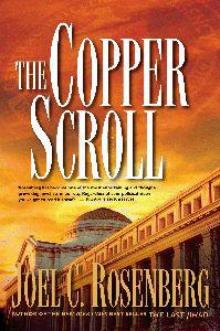 The Copper Scroll
The Copper Scroll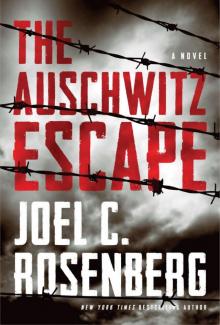 The Auschwitz Escape
The Auschwitz Escape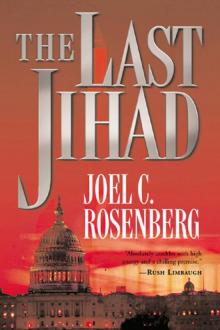 The Last Jihad
The Last Jihad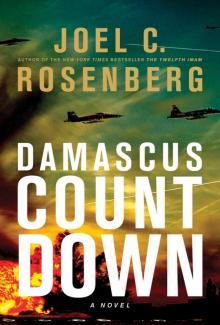 Damascus Countdown
Damascus Countdown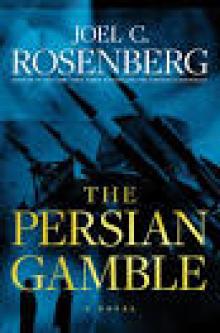 The Persian Gamble
The Persian Gamble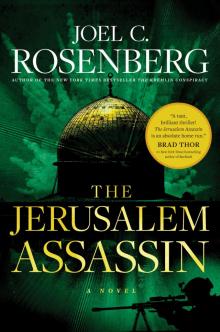 The Jerusalem Assassin
The Jerusalem Assassin Dead Heat
Dead Heat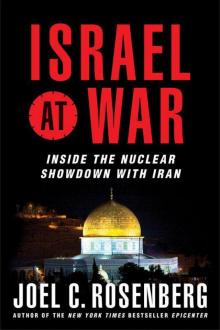 Israel at War: Inside the Nuclear Showdown With Iran
Israel at War: Inside the Nuclear Showdown With Iran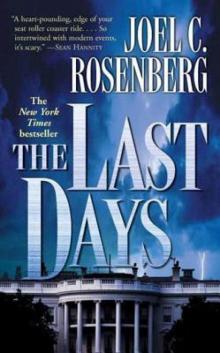 The Last Days
The Last Days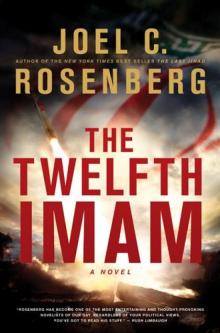 The Twelfth Imam
The Twelfth Imam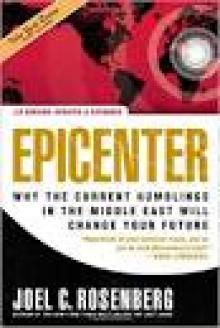 Epicenter 2.0
Epicenter 2.0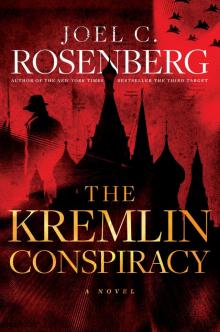 The Kremlin Conspiracy
The Kremlin Conspiracy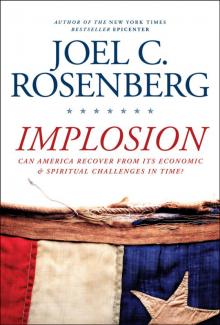 Implosion: Can America Recover From Its Economic and Spiritual Challenges in Time?
Implosion: Can America Recover From Its Economic and Spiritual Challenges in Time?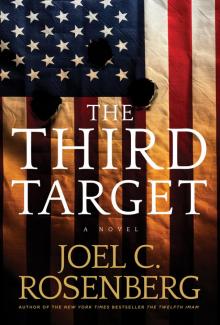 The Third Target: A J. B. Collins Novel
The Third Target: A J. B. Collins Novel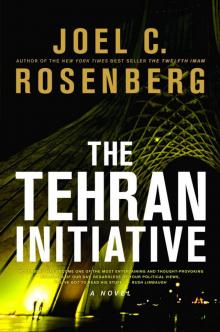 The Tehran Initiative
The Tehran Initiative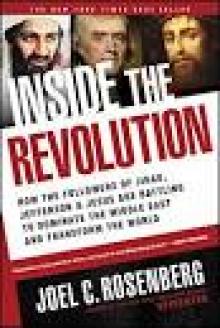 Inside the Revolution
Inside the Revolution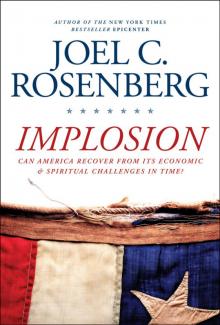 Implosion
Implosion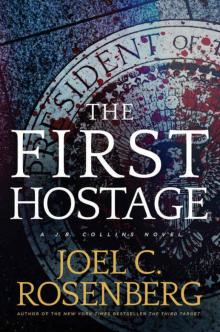 The First Hostage: A J. B. Collins Novel
The First Hostage: A J. B. Collins Novel